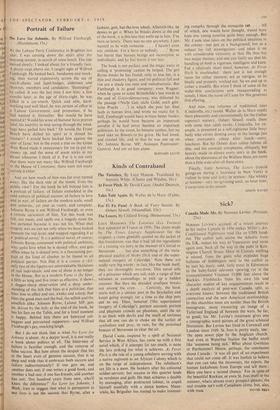Portrait of 'Failure
No Love for Johnnie. By Wilfred Fienhurgh.
(Hutchinson, I5s.) •
Ar the Labour Party Conference in Brighton last year, I was coming down the stair's after the morning session, in search of some lunch. The tide moved slowly; I looked about. for a friendly face. A dozen steps above me, I caught sight of Wilfred rienburgh. He looked back, handsome and mock- ing, then waved expansively. across the sea of watch-chains and lapel-badges, aldermen and theorists, members and candidates. 'Slumming?' he called. It was the last time I saw him; a few months later, at the age of thirty-eight, he was killed in a car-smash. Quick and able, hard- working and well liked, he was certain of office in a Labour Government, and promotion, if he had wanted it, thereafter. But•would. he have wanted it? Would his sense of humour have proVen fatal, his inability to stop seeing through the wind- bags have pulled him back? Or would the Front Bench have dulled his spirit as it shined his trousers? I would have backed him against the spur of fame; but in the event a tree on the Great West Road made it unnecessary for me to put my money up, and the sense of waste sticks in my throat whenever I think of it. For it is not only that there were not many like Wilfred Fienburgh in the House of Commons; there were not many outside it either.
And yet how much of him was for ever turned away, like the dark side of the moon, from the public view? For the book he left behind him is a portrait of failure; of fitilure embedded in the cold embers of political success; of failure in love and in war; of failure on the Modern scale, small and unheroic, yet sour. as vomit, and complete. Johnnie Byrne is not Wilfred Fienburgh, or even a 'emote caricature of him. Yet this book was felt. not made, and spells out a tragedy none the 11:NS personal because it was not his. What that tragedy was_we can see only when we have looked beneath the top layer, and stopped regarding it as a 'political novel.' It is a political novel, of course; Johnnie Byrne, consumed .with political ambition, who seeks love when he is denied office, and gets Office when he is denied love, is a fascinating por- trait of the kind of climber to be found in all political parties. Not that it is a roman a clef; only two of the ligures are unmistakable likenesses of real individuals, and one of those is no longer in the House. But as a modern Fame is the Spur, a fifth as long and live times as effective, it shows a dagger-sharp observation and a deep under- standing of the itch that bites at a politician, that bites him in office and out, awake and asleep, that bites the good ones and the bad, the selfish and the unselfish alike. Johnnie Byrne, Labour MP, gets on, driven by the itch; at the end of the book, he has his feet on the Table, and for a brief moment is happy., Behind him there are betrayed col- leagues and patronised supporters—and Wilfred
.Fienburgh's gay, mocking laugh.
But I do not think that is what No Love for Johnnie is about. At a deeper level, it is not really a book about politics at all. The bitterness of failure is familiar 'enough, and the remorse of false success. But how about the despair that lies at the heart even of genuine success, that is so deep and wide that it embraces both success and failure indiscriminately? If one gets on, and another does not; if one writes a good book, and another a bad one; if one has friends, and another has not; 'five hundred years from now, who'll know the difference?' No Love for Johnnie, 'I think, tries to suggest, that what is permanent in our lives is not the success that Byrne, after a fashion, gets, but the love which, Alberich-like, he denies to get it. When he breaks down at the end of the book, it is this loss that wells up in him. 'I've been so lonely. There was no one anywhere. I just Wanted to be with someone. . . . I haven't even any children. I'm a hero to nobody. . . .' Byrne has learnt that human beings are incomplete as individuals; and he has learnt it too late.
The book is not perfect, and the tragic irony in calling it 'promising' cannot be helped. The girl Byrne thinks he has found, only to lose her, is a thin and shadowy figure, and his political fall and rise are a shade too neat and melodramatic. But Ficnburgh is in good company; even Wagner, when he came to score Brtinnhilde's last words at the end of Gintereliimmerung, was defeated by the passage ('Nicht Gut, nicht. Gold, noch gOtt- liche Pracht . . .') in which she puts her final faith in human love, and wrote no music for it. Still, Fienburgh'would have written better books; perhaps he would have become an important novelist if he had never become an important politician. In the event, he became neither, but we need take no flowers to his grave. He had loved, and created life; and in that he was one up on Mr. Johnnie Byrne, MP, Assistant Postmaster- General. And not on 'him alone.
BERNARD LEVIN






































 Previous page
Previous page